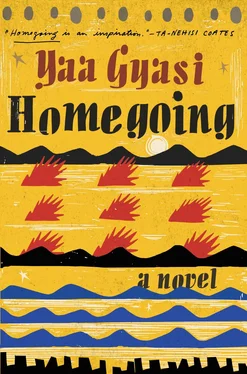H spent the next four days in the county jail. On the second day, the guards took his cellmate away. He didn’t know where. When they finally came for H, the guards wouldn’t tell him what the charge was, only that he had to pay the ten-dollar fine by the end of the night.
“I only got five dollars saved,” H said. It had taken him nearly ten years of sharecropping to put away that much.
“Maybe your family can help,” the chief deputy said, but he was already walking away, on to the next person.
“Ain’t got no family,” H said to no one. He had made the walk from Georgia to Alabama by himself. He was used to being alone, but Alabama had turned H’s loneliness into something like a physical presence. He could hold it when he went to bed at night. It was in the handle of his hoe, in the puffs of cotton that floated away.
He was eighteen when he met his woman, Ethe. By then he’d gotten so big that no one ever crossed him. He could walk into a room and watch it clear as men and women made way for him. But Ethe always stood her ground. She was the most solid woman he’d ever met, and his relationship with her was the longest he’d had a relationship with anyone at all. He would have asked her for her help now, but she hadn’t talked to him since the day he called her by another woman’s name. He had been wrong to cheat on her, wronger still to lie. He couldn’t call Ethe now, not with this shame hanging over him. He’d heard of black women coming to the jailhouse to look for their sons or husbands and being taken into a back room by the policemen, told that there were other ways to pay a fine. No, H thought, Ethe would be better off without him.
By sunrise the next morning, on a sweltering July day in 1880, H was chained to ten other men and sold by the state of Alabama to work the coal mines just outside of Birmingham.
—
“Next,” the pit boss shouted, and the chief deputy shoved H in front of him. H had been watching them check each of the ten men who’d been chained to him on the train ride there. H wasn’t even sure he could call some of them men. He saw a boy no older than twelve, shivering in the corner of the train. When they’d pushed that boy in front of the pit boss, he’d peed himself, tears running down his face all the while, until he looked like he himself would melt down into the puddle of wet at his feet. The boy was so young, he’d probably never seen a whip like the one the pit boss had laid out on his desk, only heard about them in the nightmarish stories his parents told.
“He’s a big one, ain’t he?” the chief deputy said, squeezing H’s shoulders so that the pit boss could see how firm they were. H was the tallest, strongest man in the room. He’d spent the whole train ride trying to figure out a way to break his chains.
The pit boss whistled. He got out of his chair and circled H. He grabbed H’s arm, and H lunged at him before his shackles stopped him. He hadn’t been able to break the chains, but he knew if his hands could only reach, it wouldn’t take him but a second to snap the pit boss’s neck.
“Hoo, hoo!” the pit boss said. “Looks like we’ll have to teach this one some manners. How much you want for him?”
“Twenty dollars a month,” the deputy said.
“Now, you know we don’t pay more than eighteen, even for a first-class man.”
“You said yourself he’s a big one. This one will last you awhile, I bet. Won’t die in the mines like the others.”
“Y’all can’t do this!” H shouted. “I’m free!” he said. “I’m a free man!”
“Naw,” the pit boss said. He looked at H carefully and pulled out a knife from the inside of his coat. He began to sharpen the knife against an ironstone he kept on his desk. “No such thing as a free nigger.” He walked slowly up to H, held the sharpened knife against his neck so that H could feel the cold, ridged edge of it, begging to break skin.
The pit boss turned to the chief deputy. “We’ll give you nineteen for this one,” he said. Then he ran the tip of the knife slowly across H’s neck. A thin line of blood appeared, neat and straight, as if to underline the pit boss’s words. “He may be big, but he’ll bleed just like the rest of them.”
—
It had never occurred to H, during those many years that he worked on plantations, that there was anything more than dirt and water, bugs and roots, under the earth. Now he saw that there was an entire city underground. Larger, more sprawling, than any county that H had ever lived or worked in, and this city was occupied almost entirely by black men and boys. This city had shafts for streets, and rooms for houses. And in every room, everywhere, there was coal.
The first thousand pounds of coal were the hardest to shovel. H spent hours, whole days, on his knees. By the end of the first month, the shovel felt like an extension of his arm, and indeed, his back had begun to ripple around the shoulder blades, growing, it seemed, to accommodate the new weight.
With his shovel arm, H and the other men were lowered some 650 feet down the shaft, into the mine. Once in the underground city, they traveled three, five, seven miles to the coal face where they were to work that day. H was large but nimble. He could lie on his flank and shinny himself into nooks and crannies. He could crawl on his hands and knees through tunnels of exploded rock until he got to the right room.
Once he reached the room, H shoveled some fourteen thousand pounds of coal, all while stooped down low, on his knees, stomach, sides. And when he and the other prisoners left the mines, they would always be coated in a layer of black dust, their arms burning, just burning. Sometimes H thought that burning pain would set the coal on fire, and they would all die there, from the pain of it. But, he knew, it wasn’t just pain that could kill a man in the mine. More than once, a prison warden had whipped a miner for not reaching the ten-ton quota. H had seen a third-class man shovel 11,829 pounds of coal, weighed at the end of the workday by the pit boss. And when the pit boss had seen the missing 171 pounds, he’d made the man put his hands up against the cave wall, and then he’d whipped him until he died, and the white wardens did not move him that night or the rest of the next day, leaving the dust to blanket his body, a warning to the other convicts. Other times, mine stopes had collapsed, burying the prisoners alive. Too many times, dust explosions would wipe out men and children by the hundreds. One day, H would be working beside a man he had been chained to the night before; the next day, that man would have died of God only knew what.
H used to fantasize about moving to Birmingham. He’d been a sharecropper since the war ended, and he’d heard that Birmingham was the place a black man could make a life for himself. He’d wanted to move there and finally start living. But what kind of life was this? At least when he was a slave, his master had needed to keep him alive if he wanted to get his money’s worth. Now, if H died, they would just lease the next man. A mule was worth more than he was.
H could hardly remember being free, and he could not tell if what he missed was the freedom itself or the capacity for memory. Sometimes when he made it back to the bunk he shared with fifty-something men, all shackled together on long wooden beds so that they couldn’t move while they slept unless they moved together, he would try to remember remembering. He would force himself to think of all the things his mind could still call up: Ethe mostly. Her thick body, the look in her eyes when he’d called her by another name, how scared he was to lose her, how sorry. Sometimes as he slept the chains would rub against his ankles in such a way that he would remember the feeling of Ethe’s hands there, which always surprised him, since metal was nothing like skin.
Читать дальше

![Ally Carter - [Gallagher Girls 01] I'd Tell You I Love You But Then I'd Have to Kill You](/books/262179/ally-carter-gallagher-girls-01-i-d-tell-you-i-lo-thumb.webp)










